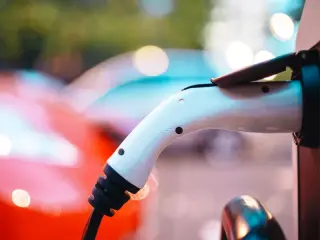
The UK’s ban on new petrol and diesel cars in 2030 is drawing closer, and the shift to electric vehicles is happening faster than ever. For UK businesses, this isn’t just about preparing for legislation; it’s about futureproofing fleets, cutting costs, and appealing to eco-conscious customers.
From electric vehicle chargers and installation costs to congestion charge exemptions, tariffs, and road tax changes, here’s everything businesses need to know about preparing for a fully electric future.
What is an electric vehicle, and a hybrid electric vehicle?
An electric vehicle (EV) is powered entirely or primarily by an electric motor. Fully electric models (BEVs) run solely on rechargeable batteries, while plug-in hybrid electric vehicles (PHEVs) combine an electric motor with a petrol or diesel engine for extra range.
There are also hybrid electric vehicles (HEVs), which use a small electric motor to support a combustion engine, improving efficiency but offering limited electric-only driving.
For businesses, EVs and PHEVs provide flexibility for fleets of all sizes, but fully electric vehicles are key for long-term sustainability. They produce zero tailpipe emissions, help meet environmental targets and offer significant running cost savings over time.
How much does it cost to charge an electric vehicle?
EV charging is far cheaper than refuelling a petrol or diesel car, especially if you primarily charge at home and take advantage of electric vehicle tariffs or off-peak rates.
Home or workplace charging: The cheapest option. A typical overnight charge can cost less than £8 for a 60kWh battery; this is even cheaper with a lower-rate EV charging energy tariff.
Public charging: Prices vary. Fast chargers are affordable, while rapid chargers at motorway services cost more for speed.
Smart tariffs: Businesses can save by scheduling charging during off-peak hours with dedicated EV tariffs.
Pairing EV tariffs with a robust workplace charging setup allows businesses to keep costs predictable and manageable.
How much does it cost to install electric vehicle charging?
The cost to install electric vehicle charging points depends on speed, features, and site requirements. Businesses typically pay £1,000 - £2,500 per charger, but grants such as the OZEV Workplace Charging Scheme can reduce costs by up to £14,000 per site.
Installing EV chargers at depots or offices also:
Reduces downtime for drivers.
Enhances employee satisfaction.
Shows commitment to sustainability, supporting ESG goals.
BYD’s price cuts and the impact on electric vehicles in the UK
Car manufacturer BYD price cuts (up to 35% across 22 models) have made EVs more affordable, driving competition and encouraging wider adoption. Lower purchase prices mean businesses can start transitioning their fleets sooner without prohibitive upfront costs.
How long does it take to charge an electric vehicle?
Charging speed depends on the charger type:
Rapid chargers (150kW+): 80% charge in under 30 minutes.
Fast chargers (7–22kW): 4 - 8 hours for a full charge.
Slow chargers (3kW): Best for overnight charging, taking 8+ hours.
Fleet managers should invest in a mix of electric vehicle chargers to suit depot schedules, driver shifts, and vehicle range needs.
The UK electric vehicle charging network in 2026 and beyond
The UK government has pledged to install 300,000 public electric vehicle chargers by 2030, ensuring accessibility for fleets and private drivers. For businesses, now is the time to plan EV rollouts to align with this growth.
Smarter EV charging with Rightcharge
Through Rightcharge, businesses can compare tariffs, installation options, and charging hardware to find cost-effective, future-proof solutions. This makes it easier to manage multiple EVs without spiralling costs. Rightcharge already has over 75,000 charging points across 39 public networks.
BP Fuel and Charge and Shell Fuel and EV
Right Fuel Card customers can access BP and Shell networks with dedicated EV charge cards. These cards simplify billing, provide access to thousands of chargers nationwide, and offer detailed reporting for fleet managers. BP Fuel & Charge gives you access to over 12,000 charge points, and Shell Recharge has coverage to over 23,000 charging points.
Do electric vehicles pay road tax or congestion charges?
Since April 2025, electric vehicles must pay road tax (VED). However, any EV registered on or after April 1st, 2025, will only pay £10. In subsequent years, you pay £195 for most EVs. But any EV over £40,000 has an additional £425 per year applied from the second to the sixth year of registration, bringing the total to £620 per year.
In London, EVs remain exempt from the Congestion Charge and benefit from reduced or waived charges in Clean Air Zones, making them ideal for businesses operating in cities. Electric vehicles will have to pay a congestion charge in London after December 24th, 2025.
Electric vehicle tariffs and workplace charging incentives
EV-specific tariffs can dramatically reduce costs by offering lower rates during off-peak hours. Pairing these tariffs with smart chargers allows fleets to optimise charging schedules.
The OZEV Workplace Charging Scheme remains a valuable incentive, helping businesses fund installation and speed up the switch to electric. Please note the OZEV Workplace Charging Scheme ends 31st March 2026.
Are electric vehicles better for the environment?
Yes. Over their lifetime, electric vehicles are better for the environment than petrol and diesel alternatives. While EV battery manufacturing produces more emissions upfront, EVs offset this quickly thanks to zero tailpipe emissions and an increasingly renewable UK energy grid.
Businesses adopting EVs early can make significant progress toward net-zero goals and meet growing ESG requirements.
Preparing your business fleet for 2026 and beyond
The transition to EVs is happening fast. Here’s how businesses can get ahead:
Plan your fleet transition now to spread costs over time.
Install electric vehicle chargers at depots and offices to support growth.
Use EV charge cards for simplified billing and reporting.
Stay on top of incentives to maximise savings and efficiency.
Right Fuel Card offers the tools and expertise businesses need to manage both traditional fuel and EV charging solutions. Whether you’re running a handful of vehicles or a large national fleet, we can help you navigate the road to electric with confidence.
Compare our fuel and EV charge cards online, or learn more about smarter EV charging with Rightcharge.




